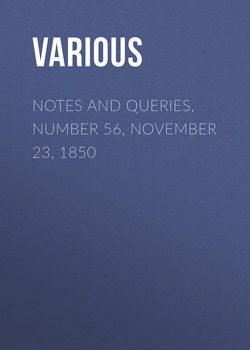Читать книгу Notes and Queries, Number 56, November 23, 1850 - Various - Страница 4
NOTES
"APRICOT," "PEACH," AND "NECTARINE," ETYMOLOGY OF
ОглавлениеThere is something curious in the etymology of the words "apricot," "peach," and "nectarine," and in their equivalents in several languages, which may amuse your readers.
The apricot is an Armenian or Persian fruit, and was known to the Romans later than the peach. It is spoken of by Pliny and by Martial.
Plin. N.H., lib. xv. c. 12.:
"Post autumnum maturescunt Persica, æstate præcocia, intra xxx annos reperta."
Martial, lib. xiii. Epig. 46.:
"Vilia maternis fueramus præcoqua ramis,
Nunc in adaptivis Persica care sumus."
Its only name was given from its ripening earlier than the peach.
The words used in Galen for the same fruit (evidently Græcised Latin), are προκοκκια and πρεκοκκια. Elsewhere he says of this fruit, ταυτης εκλελειφθαι το παλαιον ονομα. Dioscorides, with a nearer approach to the Latin, calls apricots πραικοκια.
From præcox, though not immediately, apricot seems to be derived.
Johnson, unable to account for the initial a, derives it from apricus. The American lexicographer Webster gives, strangely enough albus coccus as its derivation.
The progress of the word from west to east, and then from east to south-west, and from thence northwards, and its various changes in that progress, are rather strange.
One would have supposed that the Arabs, living near the region of which the fruit was a native, might have either had a name of their own for it, or at least have borrowed one from Armenia. But they apparently adopted a slight variation of the Latin, το παλαιον ονομα, as Galen says, εξελελειπτω.
The Arabs called it برقوق or, with the article, البرقوق.
The Spaniards must have had the fruit in Martial's time, but they do not take the name immediately from the Latin, but through the Arabic, and call it albaricoque. The Italians, again, copy the Spanish, not the Latin, and call it albicocco. The French, from them, have abricot. The English, though they take their word from the French, at first called it abricock, then apricock (restoring the p), and lastly, with the French termination, apricot.
From malum persicum was derived the German Pfirsiche, and Pfirsche, whence come the French pêche, and our peach. But in this instance also, the Spaniards follow the Arabic بريشان, or, with the article البريشان, in their word alberchigo. The Arabic seems to be derived from the Latin, and the Persians, though the fruit was their own, give it the same name.
Johnson says that nectarine is French, but gives no authority. It certainly is unknown to the French, who call the fruit either pêche lisse, or brugnon. The Germans also call it glatte Pfirsche.
Can any of your readers inform me what is the Armenian word for apricot, and whether there is any reason to believe that the Arabic words for apricot and peach, are of Armenian and Persian origin? If it is so, the resemblance of the one to præcox, and of the other to persicum, will be a curious coincidence, but hardly more curious than the resemblance of πασχα with πασχω which led some of the earlier fathers, who were not Hebraists, to derive πασχα from πασχω.
E.C.H.
